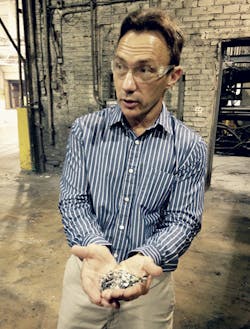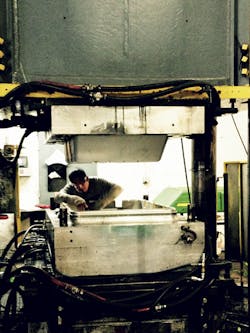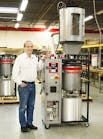Recycler CTC Plastics LLC (Composite Technologies Co. LLC) of Dayton, Ohio, is enjoying the results of its decision to take a few steps back to move forward. Officials there have pushed onward with an aggressive efficiency plan that resulted in a reduction of the workforce by nearly half and ongoing automation of plant processes. CTC is in the business of taking scrap — some 70 million pounds of it projected for all of 2015 — and transforming it into usable pellets and then into products such as pallets for materials handling.
CTC is both a compounder and a molder. It also offers toll services to other resin companies in the form of grinding, compounding and pelletizing. The company operates two plants in Dayton, one now dedicated solely to molding and the other dedicated to compounding, for a total manufacturing footprint of 497,000 square feet. This operational delineation is the result of strategic changes to make the company more efficient and lean.
On the second floor of its compounding factory are aisles and aisles of post-industrial materials — everything from diaper cutouts to biaxially oriented PP potato chip bags. There also is a stack of DVD cases. Until now, the company's recycled material has mostly been post-industrial, but part of CTC's strategic plan includes recycling post-consumer materials.
Machinery and automation technologies are at the forefront of that plan. The endgame is to compound 100 percent recycled resin to com-pete against virgin and wide-spec resin. CTC markets its resins as X-Pro. To processpost-consumer materials, CTC will be installing a washing line in the near future. CTC will begin adding optical sorters in mid-2016, which will allow the company to sort like-color and clear materials.
Primarily, the company will be going after PP.
"We have the ability to formulate to meet any desired property," says Mike DeMatto, CTC's COO, in a recent interview. "Our resins are used as 100 percent drop-ins and have replaced virgin resin in many applications."
The company has the ability to develop custom blends in PP, PE, TPO, impact modifiers, stiffening agents, colorants, mineral-filled commodity-grade resins and HIPS.
CTC, where DeMatto has worked since 2013, is one of the leading suppliers of resins for wheel liners for the North American automotive industry. The company's aggressive plan carries with it a goal to grow total business from $30 million a year in revenue to $60 million by 2020.
"We are going to achieve that by focusing our energy on filling our open capacity in our compounding plant," says DeMatto. "We are adding filled polypropylene and colorable resins to our recycled resin line on our twin-screw extruder. We are going to be adding post-consumer raw material to our mix, and we will grow our proprietary plastic pallet line substantially at our molding plant."
A co-rotating 92mm twin screw extruder is a new addition for the company, added within the last year and boosting CTC's compounding capacity by 25 million pounds. It primarily is used for filled PP and glass-filled materials. It is made by Nanjing Giant Machinery Ltd., Nanjing, China, and equipped with a strand cut line pelletizer from Nanjing Giant along with the loss-in-weight feeders. The extruder is powered by a 420 horsepower motor with a length-to-diameter ratio of 48 to 1. It can handle single- or double-side feed of mineral introduction into the line.
CTC's other six extruders are 6-inch single-screw models. The company also has five underwater pelletizers from Gala Industries Inc., Eagle Rock, Va., and one water ring pelletizer from Nordson Xaloy Inc., New Castle, Pa.
DeMatto thinks that twin-screw configurations are an underutilized asset in recycling operations.
"You get a whole lot more shear and mixing than you get on a single screw and the beauty of it is, you can quickly take it apart and change the screw configuration to do whatever you want it to, depending on what you're running," he says.
Outsiders share DeMatto's enthusiasm for where CTC is headed.
"Mike DeMatto has a solid vision for this business and we are proud to be a part of the transformation," says Mike Diletti, managing director of recycling equipment maker Ettlinger North America LP, Tyrone, Ga.
Ettlinger has provided one ERF250 continuous melt filter machine and DeMatto has plans to add more.
"The Ettlingers are tremendous machines that are perfect for the recycled resin world," says DeMatto. "They allow double the output while handling and filtering contaminated product in a very cost-effective manner."
GETTING LEAN TO STAY COMPETITIVE
DeMatto talks process and efficiency as though he is thinking about it 24 hours per day, seven days a week. There are many areas in which CTC still will improve, notably in automating how the materials are blended and delivered throughout the plant. CTC has made its name with a specialized mixing and delivery system that grinds the scrap, then densifies and formulates it using varying percentages of each type to meet certain physical properties. The material is then ribbon blended using a scale that weighs each ingredient. The blend is then conveyed to extruders and compounded into the finished pellet. The molding plant still does not have its blending room equipment on load cells, but that will change.
CTC owns most of the capacity needed for its growth plan. It added the ERF250 continuous melt filter this year and plans to add another one in 2017 and then another in 2018 that will allow it to achieve the needed resin output.
During Plastics Machinery Magazine's visit, the ERF250 was in production on one of the single-screw extruders. It can process 3,000 pounds per hour of highly contaminated materials; the unit has pressure stability at all times. Screen changes are needed only every two to three weeks. The machine effectively filters out paper, aluminum foil, wood, PET, nylon, rubber and silicone.
Making operations leaner is critical to success, says DeMatto. There is no question that the recycled resin market is brutal now, with falling prices of oil affecting the price of virgin resin. In recycled resins, the conversion costs are very high.
"If we didn't do what we did back at the end of last year, we would have been in rough shape right now," says DeMatto. "But we are thriving and doing very well."
The company has 75 employees now, down from 125. Most of the downsizing affected temporary workers, says DeMatto. CTC offered longer shifts to core employees to make up the difference.
"They could make more money and we aren't using temps," says DeMatto. "It made sense."
In these operations, training and a knowledgeable workforce are critical. In the molding plant, one compression molding press forms pallets and another is being used to produce a part for a major customer. Unlike other updates in machinery and technology, this technology is very old. The biggest press is a 4,000-ton, four-post hydraulic K.R. Wilson press with a bed size of 96 inches by 144 inches. It is mammoth, to say the least, dominating the plant floor nearly up to the ceiling. This plant has a total of eight compression molding machines, the smallest machine coming in at 750 tons of force with a bed size of 42 inches by 52 inches.
The resin needed for production of the pallets and other products is processed through a Davis-Standard 6-inch extruder. An accumulator does its job and the machine produces the needed volume of resin. A worker takes it by hand and loads it into the mold.
The compression machine may be old technology, DeMatto says, but it is effective for CTC's needs. Operating a machine like this is a laborious process, though, as workers manually feed the resin into the compression mold. Two black, oblong-shaped resin forms are loaded into the mold of the 4,000-ton press. In a 90-second cycle, a pallet is produced.
"We have a pretty good track record with our safety," says DeMatto. "We put some pretty aggressive safety measures in place because we know our process is very manual. So we make sure our guys are safe."
The pallet is one of the highest-margin products for the company, and demand is growing. The machine is capable of producing four pallets at once by using different tool configurations. The tertiary process here is injection molding. One 3,000-ton Cincinnati Milacron press now is located in the molding plant. A 1,000-ton Van Dorn press has been disassembled at the other plant, so that it can make the move and join its brethren.
On the plant floor, there is a noticeable difference for employees. There are far fewer forklifts and trucks used to transport raw materials.
"We streamlined and actually, we blow everything now," says DeMatto of the air conveyance system that has replaced the manual process. "It used to be that there would be a lot of guys on forklifts, just moving the material around, guys driving trucks back and forth between the two plants. Just a lot of waste, right? Two production managers, two of everything. So we leaned things down. Then our output went up dramatically, too, just from having everything moving automatically because there is no potential downtime because an employee moves something he shouldn't have."
QUALITY TESTING IS NEXT TO GODLINESS
Quality testing is crucial in this line of business. CTC is taking scrap, which can have anything in it, from other companies. Metal, paper, you name it, CTC has seen it. Illustrating the importance of material integrity, CTC has two quality labs, one for raw materials and the other for finished products.
"We test every box of raw material that comes in here," says DeMatto. All the necessary testing is performed for automotive specs. CTC has three compounding lines dedicated to the automotive industry and also has automotive quality certifications.
In its two labs, tests determine material content, tensile strength, flex modulus, melt flow rate, ash content, density, shrink rate and moisture percentage. The tests include Izod/Charpy impact tests, the Gardner impact test (falling dart impact) and heat-deflection temperature analysis.
The testing equipment that populates the labs is from Tinius Olsen. Lab managers oversee each lab and maintain samples. The materials go through daily quality management reviews with data-driven and statistically valid process input and output-control systems.
Angie DeRosa, managing editor
Contact:
CTC Plastics LLC, 937-228-2880, www.ctcplastics.com








